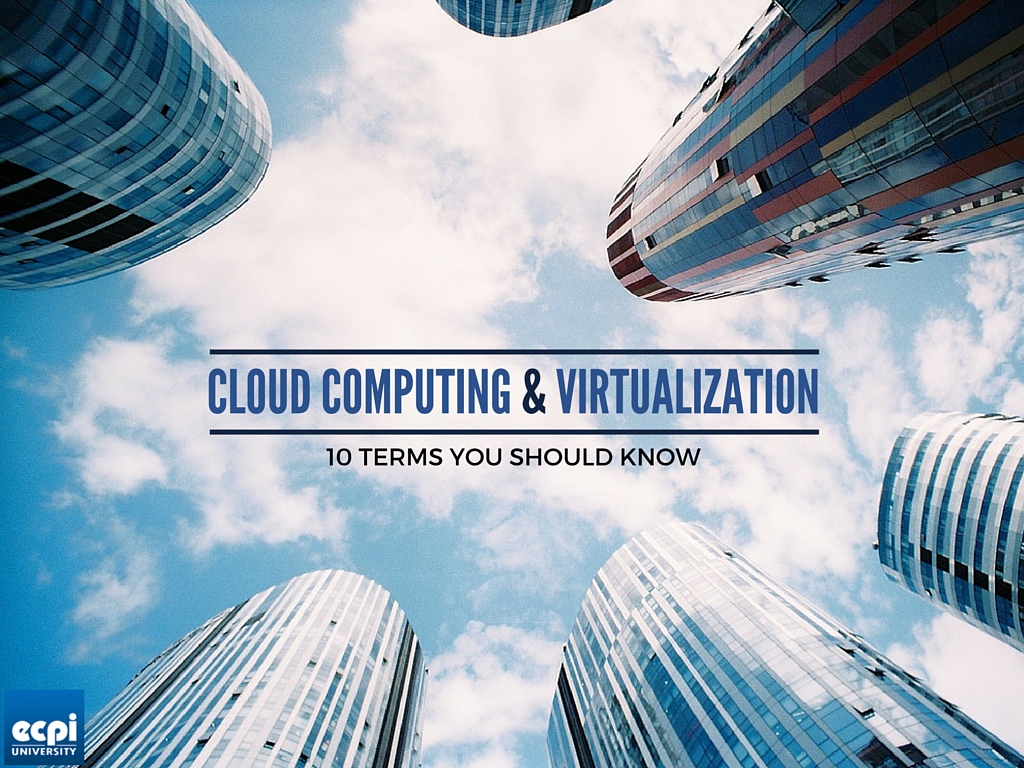
The fields of computer science and technology are in a state of constant change, and nowhere is that more evident than in the area of cloud computing and technology. Both cloud computing and virtualization are relatively new technologies, and both the scope of their capabilities and market presence.
Like any technology, cloud computing and virtualization have a lingo that's all their own. And if you're interested in pursuing an education in this field, here are some of the terms you'll need to know:
1. Hypervisor
In virtualization technology, a hypervisor is a software platform that manages multiple instances of one or more operating systems on a single computer hardware system. The hypervisor manages the overall local virtualization environment, including the system's processor, memory, and other resources, allocating those resources as needed to each individual operating system instance within the same environment. Hypervisors may also be called virtualization managers.
2. Virtual Machine (VM)
A virtual machine, usually known as a "guest", are the individual operating system instances within a given virtualization environment. Just as the hypervisor manages the overall virtual environment, a virtual machine acts as an individual computer, performing tasks such as running applications and/or acting as a server.
3. Infrastructure as a Service (IAAS)
Infrastructure as a Service (IaaS) describes a model of cloud computing where the computing, storage and network infrastructure that commonly support a given virtual environment are provided as a service by a hosting provider. Rather than purchasing servers, software, data-center space, or network equipment, clients instead buy those resources as a fully outsourced service.
4. Platform as a Service (PaaS)
Platform as a service (PaaS), is a model for cloud services delivery. Like Infrastructure as a Service (IaaS), PaaS offerings provide the underlying hardware and software and provisioning hosting capabilities. PaaS services, however, go further than IaaS in that they also provide management of individual operating systems and common types of applications such as databases or middleware applications, allowing the client to focus on development of their application, without having to worry about the underlying systems and infrastructure.
5. OpenStack
OpenStack is an open-source cloud operating system, designed to utilize and manage pools of resources across diverse groups of servers and storage within one or more data centers, in order to provide a public or private cloud environment. Comprised of a number of modules that can be used separately or in conjunction with one another, OpenStack provides management of computing, storage, networking, and wide range of associated services. OpenStack is commonly used in the virtualization and cloud computing industry, and is considered to be a competitor to CloudStack, another cloud management platform.
6. Public Cloud
A public cloud simply refers to a given cloud environment, such as Amazon Web Service, where the cloud infrastructure is made available to the general public or a large industry group and is accessible by many different organizations and enterprises.
7. Private Cloud
In a private cloud, the technical architecture and elements (computing, storage and network) are similar to a public cloud, but are dedicated for use by single organization. Private clouds may be managed by the organization or by a third party, and may be located on-premise or off-premise.
8. Virtual Private Cloud
A virtual private cloud is a set of resources (computing, network and storage), that reside within a public cloud but are segmented from the other tenants, providing a 'cloud within a cloud' environment for a given customer.
9. Multitenancy
Multitenancy refers to the ability of multiple clients to share resources within the same virtual environment. Each of the tenants is essentially a different organization or customer, with access to their own virtual environment. The underlying computing, storage and network that supports that tenant also supports other tenants as well, with resources shared across them. This allows cloud providers to efficiently utilize resources, and share them across tenants as needed.
10. Hybrid Cloud
A hybrid cloud is essentially a combination of different cloud platforms, such as an organization's private cloud running within their premise, and a public cloud environment, utilized for different functions but managed from a central location. Cloud management systems such as OpenStack provide interoperability and management.
Awesome school, great opportunities for the young people starting a career.
Posted by Evangelist Crystal Sanders on Thursday, September 3, 2015
Getting Your Cloud Computing Degree at ECPI
At ECPI University, we have designed a program to give you the knowledge and experience you'll need for a career in cloud computing. Through our year-round schedule, you could earn a Bachelor of Science degree in Computer and Information Science with a concentration in Cloud Computing in just 2.5 years
Our flexible schedule means you could take classes day, night, and online, and our learning emphasizes hands-on activities in addition to classroom lecture, which can maximize your learning experience and retention, allowing you to hit the ground running once you reach the workplace. Contact us today—it could be the Best Decision You Ever Make!
DISCLAIMER – ECPI University makes no claim, warranty or guarantee as to actual employability or earning potential to current, past or future students or graduates of any educational program we offer. The ECPI University website is published for informational purposes only. Every effort is made to ensure the accuracy of information contained on the ECPI.edu domain; however, no warranty of accuracy is made. No contractual rights, either expressed or implied, are created by its content.
For more information about ECPI University or any of our programs click here: http://www.ecpi.edu/ or http://ow.ly/Ca1ya.


